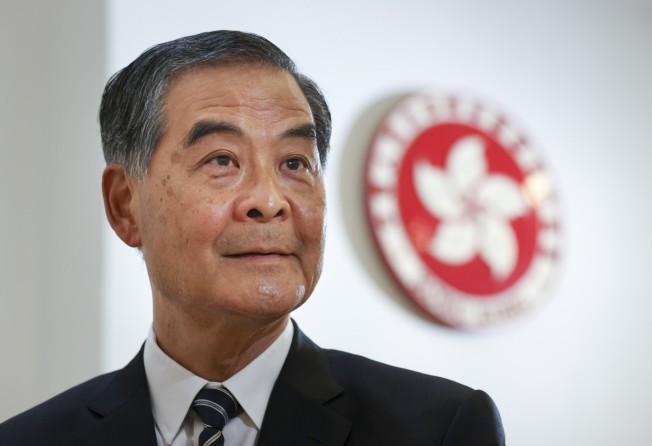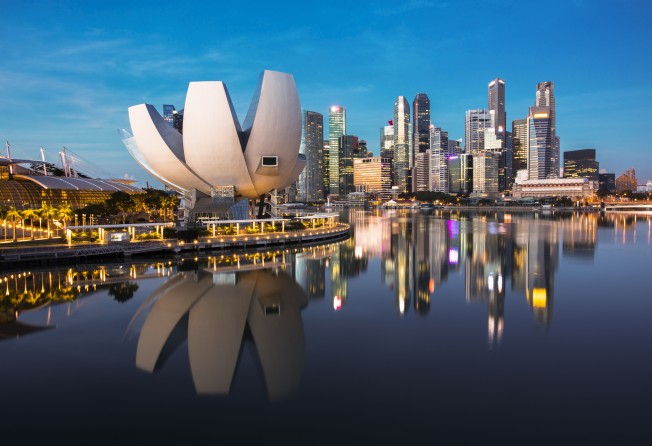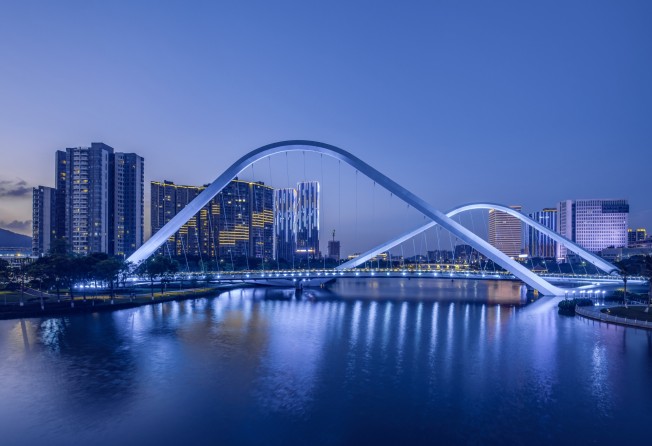
Former Hong Kong leader CY Leung dismisses concerns over talent lost to Singapore, stresses allure of ‘gateway to China’
- But consulting and recruitment professionals warn that Hong Kong faces hurdles in drawing companies back
- Leung also reveals he will lead delegation to economic zone of Nansha in hopes of convincing businesses to establish operations

Former Hong Kong leader Leung Chun-ying has dismissed concerns over the loss of talent to Singapore, saying the outflow is only temporary and companies prefer basing operations in a city that serves as a gateway to the mainland Chinese market.
But consulting and recruitment professionals on Saturday cautioned that companies would consider the expenses involved in returning to Hong Kong and noted some firms had laid down roots elsewhere in the region after the pandemic upended traditional supply chains.
Leung, a former top non-executive director of several companies under Singapore’s state-owned investor Temasek, expressed confidence that Hong Kong’s advantages would once again take centre stage in the region, given Covid-19 restrictions had ended.
“I believe that the moving of talent and enterprises to Singapore is solely temporary due to the pandemic situation in Hong Kong previously and relevant isolation policies,” he told a radio programme.

As proof of Hong Kong’s vitality, Leung pointed to the Global Financial Leaders’ Investment Summit held in November last year, which attracted more than 200 decision-makers in banking.
Leung also insisted foreign businesses remained committed to the city despite what he called unfounded fears of their governments over changes to its political landscape.
Some Western governments have claimed civil liberties have been eroded by Beijing’s introduction of the national security law and changes to the electoral system to ensure only “patriots” held power.
But business decisions did not always align with political statements, he noted.
“Over the past period of time, one can see how their business sectors have acted very differently from what their governments have said,” Leung said.
“If we manage our national development properly, we don’t have to worry about what the Americans say on whether China is a place for investment.”
At the height of the fifth Covid wave last year, reports emerged of a wave of expatriates leaving the city, with some seeking opportunities in countries such as Singapore.
More than 113,000 residents left Hong Kong between mid-2021 and mid-2022, according to latest official statistics. In the 12-month period before that, 89,200 residents left the city.
Towards the end of last year, both Hong Kong and Singapore unveiled ambitious plans to lure foreign talent, heightening the long-standing rivalry between the regional hubs.
But Singapore suffered from a scarcity of land and a limited population base, Leung argued. “How much more foreign talent can they attract to help develop the economy without evoking grievances among citizens?” he said.
He also stressed the advantages of Hong Kong’s links with the mainland under the “one country, two systems” policy, pointing to the recently relaunched high-speed rail as an important link for businesses seeking proximity to the vast market across the border.
Leung noted Singapore had not built a planned high-speed rail with Malaysia, its nearest trading partner in the Association of Southeast Asian Nations, or Asean.
“We don’t need to mention Singapore all the time. They have their opportunities and we have our own,” he said, adding that while Hong Kong enjoyed advantages from being so closely connected with the mainland, Singapore could leverage its proximity to Asean neighbours.
Armstrong Lee Hon-cheung, managing director of Worldwide Consulting Group, said luring talent and companies back to Hong Kong would take one or two years, at a minimum, despite the many advantages of doing businesses in the city.
“Hong Kong does have its unique advantages,” he said. “It has free flow of capital, a low tax rate, a sound legal system … and now there are plenty of opportunities under the Belt and Road Initiative and in the Greater Bay Area. But coming back will incur some fixed costs, like the rental, and this process could take years.”
A company’s decision to establish a local presence would also depend on which market they were pursuing, Lee noted. For instance, a business focused on serving the Southeast Asian market, rather than Greater China, might choose to remain in Singapore, he said.
Nick Marsh, managing director of Meraki Executive Search and Consulting, said he expected Hong Kong would regain the ground it lost to Singapore, but perhaps not all of it, especially in terms of regional leadership.
Investment no longer flowed entirely into China as businesses had diversified their operations across Southeast Asian countries, such as Thailand and Vietnam, after the pandemic upended traditional supply chains, he warned.
“There is a lot for Hong Kong to catch up on, and it’s important to take into account that businesses are less inclined to invest in China,” he said. “Hong Kong has taken a laissez-faire approach in attracting talent, but Singapore has been doing this aggressively for the past 15 years.”

Leung also revealed he would lead an 80-member business delegation to Nansha, a district in Guangzhou earmarked as a technology hub, as part of a committee facilitating exchanges between Hong Kong and the neighbouring mainland province of Guangdong. He said he hoped to convince as many as 10 firms to set up offices in the district.
“If I can achieve that, I believe it will lead to an explosive development in Hong Kong, Macau and Guangdong,” he said.
Leung called on business leaders to travel to the mainland and witness the changes for themselves, and urged Hong Kong to play its part by “telling the China story” well.
At the same time, the city should strive to evolve its existing industries, he said. For example, the maritime services industry could grow beyond its traditional logistics roots and offer sophisticated insurance deals and related legal solutions, he added.